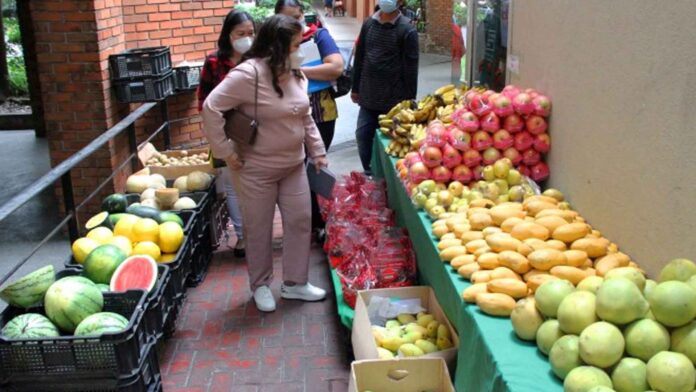The government’s Kadiwa store project has already served 450 farmer groups and around 1.22 million households, providing consumers with affordable goods until commodity prices go down.
As of November or a month after its launch under the auspices of the Department of Agriculture (DA), the Kadiwa project has generated PHP418 million in sales from 19,383 selling activities, benefitting farmer cooperatives and associations (FCAs) and agri-fishery enterprises nationwide.
“Kadiwa ng Pasko” activities, which will continue beyond the holidays, have also generated P15 million in sales as of Dec. 11, according to data from Malacañang.
Kadiwa likewise provides farmers with loans, reducing logistics costs and improving agricultural infrastructure as the administration works to ensure food security.
“Ito ay isa sa mga maaaring gawin ng inyong pamahalaan para tulungan ang taumbayan para mas maluwag ang buhay ng ating kababayan. Kaya’t maraming maraming salamat. Ako ay natutuwa na makita na nabuhay itong Kadiwa kasi magandang programa talaga ‘yan (This is one of the administration’s undertakings to give our countrymen a more comfortable life. So, thank you. I am grateful that this Kadiwa is being implemented because this is really a good program),” President Ferdinand R. Marcos Jr. said during a “Kadiwa ng Pasko” launch in Mandaluyong City on Nov. 16.
The Kadiwa project is among the campaign promises of Marcos and he had previously thanked the Duterte government for resurrecting the program that started during the administration of his late father and namesake.
DA Assistant Secretary Kristine Evangelista said in a “Laging Handa” public briefing on Dec. 2 that Marcos, the concurrent DA Secretary, wants consumers to benefit more from affordable and accessible agricultural commodities.
“Nabanggit po iyan ng ating mahal na Presidente dahil nakita nga po niya na malaki po ang difference ng presyo ng mga produktong ibinibenta sa Kadiwa kumpara po doon sa mga binibenta sa ibang mga lugar, at ito po ay talagang nakakatulong sa ating mga consumer (Our beloved President mentioned that there’s a huge difference between the prices of products sold in Kadiwa compared to other markets, and that it truly helps our consumers),” she said, adding that Kadiwa may be extended until March next year.
Aside from putting up Kadiwa outlets, the government operates the Agri-Pinoy Trading Centers (APTCs) and Diskuwento (Discounted) Caravans and has worked to stabilize sugar supply and prices.
To date, the DA is operating 15 APTCs nationwide, boosting the income of at least 219,201 farmers and fishermen.
Through the APTCs, the DA facilitated the trade of 214,758.21 metric tons (MT) of crops, 90,248 heads of livestock, and 1,789.94 MT of fishery products valued at PHP16.65 billion.
Support services
The administration also focused on distributing unused agricultural lands to agrarian reform beneficiaries to increase productivity.
On top of this, the DA distributed seeds, fertilizer, and fuel discount vouchers, farm inputs and materials, and provided farmers with irrigation facilities.
Malacañang said the government extended PHP1.25 billion in loans to 10,586 small farmers and fishers (SFF) and 119 registered micro and small agri-fishery enterprises (MSE)/farmer and fisherfolk organizations through the Kapital Access for Young Agripreneurs (KAYA) and the Agri-Negosyo (ANYO) Loan programs.
Those were on top of the PHP482.52 million in loans provided to 35,222 SFF and one MSE borrower under the Survival and Recovery (SURE) loan assistance programs.
Some 179 sugarcane farmer-borrowers, meanwhile, availed of PHP120.93 million in loans under the Sugar Industry Development Act (SIDA) Socialized Credit Program.
Malacañang said PHP345 million worth of loans and PHP2.6-billion Farmers Financial Assistance were released through the Rice Competitiveness Enhancement Fund program.
Movement of goods
To lower transport costs for food and other basic goods, the Marcos administration carried out the Unified Logistics Pass for seamless movement of trucks when transporting agricultural products and other basic goods.
The government also imposed a moratorium on collection of pass-through fees and constructed more rural infrastructure.
From July to November, the Department of Public Works and Highways (DPWH) constructed 75 kilometers of farm-to-market roads and has implemented 533 projects under the DPWH-DA convergence Agri-Infrastructure Support Program, completing 67 projects as of Oct. 30.
For 2023, the administration vowed to implement more measures to further ensure stable food sources, prices, and supply.
Among the planned initiatives are increasing production using research and modern technologies, improving value chain efficiency and increasing farmers’ income to encourage others to venture into agriculture, particularly the youth.
Further, the government will formulate a three-year development plan to improve food logistics, strengthen the regulatory functions of the Maritime Industry Authority and continue efforts to promote alternative modes of transportation. (PNA)






